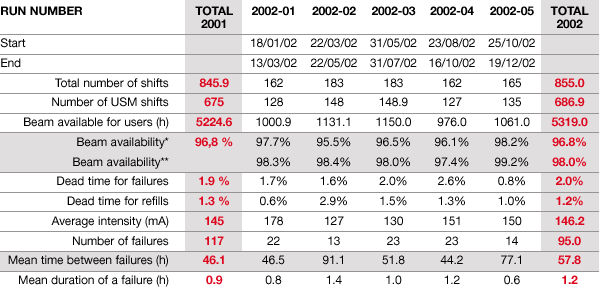- Home
- Users & Science
- Scientific Documentation
- ESRF Highlights
- ESRF Highlights 2002
- The X-ray Source
- Summary of Machine Operation
Summary of Machine Operation
The figures of merit for 2002 (Table 5), namely the mean time between failure (MTBF) and availability, were maintained at the same level as in 2001. This confirms the high level of reliability. A total of 687 shifts (5495 hours) were scheduled for delivery to the Users. Seven shifts (56 hours) were dedicated to radiation tests or Personal Safety System checks. Out of these 5495 scheduled hours, 5319 hours were actually delivered, which represent an availability of 96.8% (to be compared with 96.4% in 2000 and 96.8% in 2001) The remaining hours are shared between the dead time for refills: 67 hours for 507 refills (i.e. 1.2% of USM time) and the time lost due to failures: 110 hours (i.e. 2% of USM time) for 95 beam interruptions. This gives a record MTBF of 57.8 hours (to be compared with 38 hours in 2000 and 46.1 hours in 2001). It is worth pointing out that these results, and in particular the low rate of failures, were maintained whilst a lot of development work was under way: in particular, the successful tests of the Soleil superconducting cavity installed throughout 2002. These tests were performed without any change of the beam size, bunch length and with the same stability. Indeed, this was fully transparent to user operation. Another way to appreciate these figures is to bear in mind that there were 17 periods with more than 72 hours of delivery without a single failure, out of which 9 periods were greater than 120 hours.
 |
|
Table 5: Statistics of availability of the beam in 2002. |



